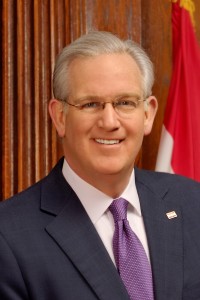JEFFERSON CITY, Mo. — While the Missouri General Assembly continues to tout the passage of a balanced budget, one issue so far — the veto of Senate Bill 350, the “circuit breaker” tax credit reform — created about a $54 million deficit.
During the final days of session, scrambling began as legislators worked to find a solution to continue to fund a few programs that would lose funding because of the veto. Two bills were passed and sent to Gov. Jay Nixon, which could solve the contentious program-funding deficit.

House Budget Chair Rick Stream, R-Kirkwood, said the veto came as a shock during the final week of session as the legislature was under the impression the bill had the governor’s utmost support. However, Stream stressed that the budget passed by the House was, ultimately, balanced.
This isn’t the first time that the balanced budget passed by the General Assembly has been dependent on the final approval of legislation, Stream said, adding that the tax amnesty and streamline sales tax bills carry similar budgetary weight.
“Since we have to pass the budget out at the end of March, sometimes there’s legislation that hasn’t passed or hasn’t gotten through,” he said. “We’ve also done that in years past.”
Stream said of the three bills, the circuit breaker legislation was the one he was most confident had a chance of being passed because he said the language that was used in SB350 mirrored that which was “proposed by Nixon in his State of the State speech and in his budget,” he said.
According to Nixon’s veto letter, he states that the action taken to eliminate the renter’s portion of the circuit breaker tax isn’t close enough to a tax reform package.

State Budget Director Linda Luebbering told The Missouri Times in an email that the governor has called for “comprehensive, broad-based tax credit reform” for several years, and the action taken by the legislature wasn’t “a comprehensive approach.”
“The governor made it clear earlier this session that he would veto that limited approach to tax credit reform,” she said.
Several major funding concerns followed the veto with questions about how programs like First Steps and the Senior Services Protection Fund would be funded. Money for each of these programs had be shifted during the budget process so the funds saved from the elimination of the portion from the circuit breaker tax would fund the other programs, loosely.
Sen. Kurt Schaefer, R-Columbia, who chaired the Senate Appropriations Committee that is responsible for the budget in the upper chamber, said the governor put the Assembly in, arguably, a lose-lose situation.
“[He put] us in a position of either backfilling the Senior Protection Fund with General Revenue, in which case we’re spending $54 million more than the governor, then he’ll blast us for spending $54 million more than him,” Schaefer said. “Or, he forces us to make cuts that he didn’t recommend, then he’ll come out and say ‘well you guys made cuts and you’re awful because I didn’t make those cuts.’”
Luebbering said that during the budget conference committee, the committee chose to fund First Steps using the circuit breaker savings, and the governor recommended using General Revenue funds, “which would have assured uninterrupted serves for families.”

“Both the House and Senate originally agreed to fund First Steps from General Revenue,” she said. “It was not until the end of the conference committee that the General Revenue for First Steps was eliminated and replaced with circuit breaker funds.”
Two bills were truly agreed and finally passed that sought to solve the deficit dilemma for these programs. One was House Bill 116, a bill regarding the duties of the auditor, and the other is House Bill 986, which is a health care bill.
As far the comprehensive tax credit or economic development reform package that Nixon called for, the legislature adjourned last week without getting anything across the finish line.
For many, including leadership like Senate President Pro Tem Tom Dempsey, the lack of the tax reform or economic development package has been one of the noted trials of session, looking back. Dempsey said he’s already considering looking toward other priorities for next year.
To contact Ashley Jost, email ashley@themissouritimes.com, or via Twitter at @ajost.
Ashley Jost is no longer with The Missouri Times. She worked as the executive editor for several months, and a reporter before that.



